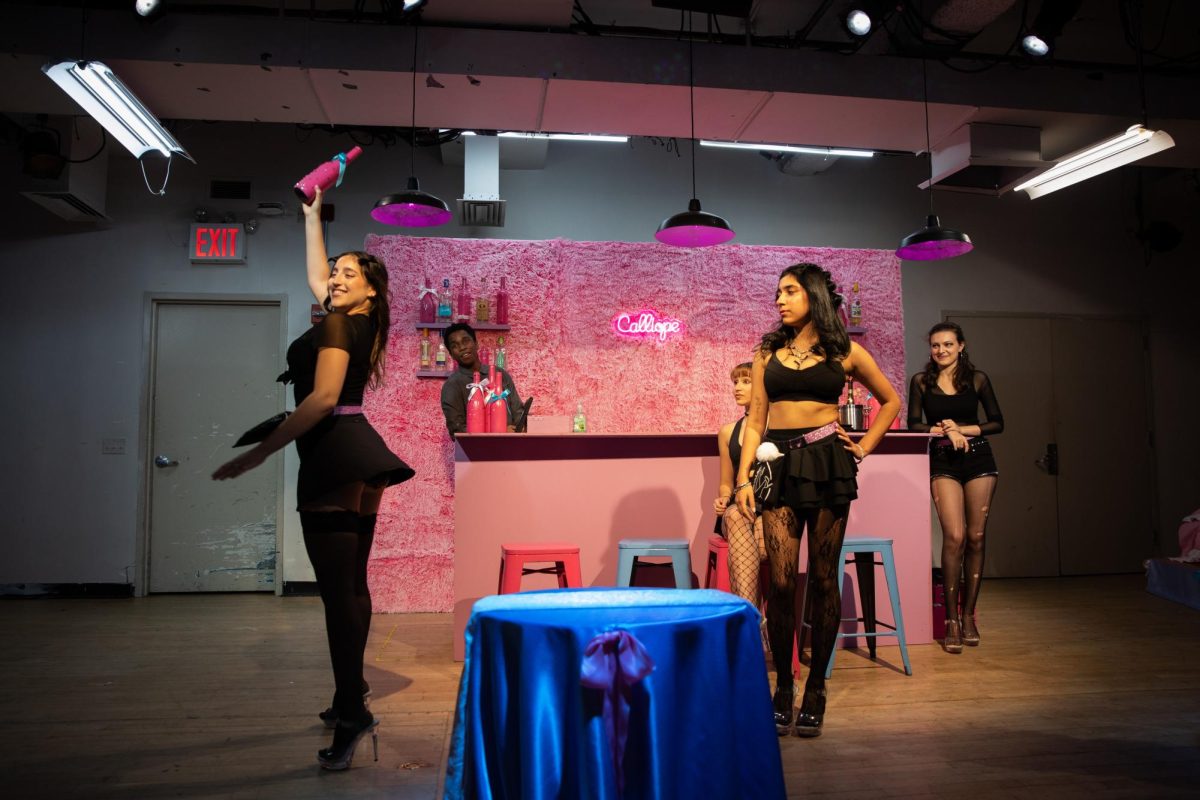“My Sweetest Baby Angel Princess,” the thesis play written and directed by Vivienne Blouin, Fordham College at Lincoln Center (FCLC) ’24, premiered in the White Box Theatre at Fordham Lincoln Center on Nov. 14. Blouin sought to explore “the nuances of sexuality, gendered sexual expectations, friendship, romance, and finances in a post-pandemic world” through her production.
“My ultimate goal with this piece is to spark conversation,” she said. “I obviously have my own opinions, but the most exciting thing for me as a writer and director is hearing the audience debate certain aspects of the story as they leave; that means they truly engaged with it, and hopefully continue to think critically about digital media going forward.”
As audiences filter into the White Box Theatre, they are greeted by bouncers who checked IDs and wristbanded guests, welcoming them into Calliope, the nightclub that serves as the setting for much of the story. Bottle girls (Amanda Rodriguez, FCLC ’26; Giordana Simurdiak, FCLC ’24; and Gia Sood, FCLC ’27) pass out menus and take shots (of Sprite) with the audience as a playlist of all the past decade’s greatest hits blares throughout the space.
“My Sweetest Baby Angel Princess” repeatedly emphasizes the tension between the online world and the real world.
The play follows Dollie (Yasemin Cem, FCLC ’25), a New York City bottle girl who, when the nightlife scene shuts down due to the COVID-19 pandemic, begins a lucrative side career in the online porn industry, posing as a child. Shortly after her return to bottle service, she meets and begins dating a middle school algebra teacher named Joe (Elian Rivera, FCLC ’25), convincing herself that his attraction to her stems from unfulfilled fantasies with his students.
Joe, Dollie, her best friend Lex (Simurdiak), fellow bottle girls Sadie and Steph (Sood and Rodriguez), and their bartender/manager Cris (Joshua Screen, FCLC ’24) navigate the neon-light-soaked nightlife scene, where the line between exploitation and agency is blurred beyond recognition.
Outside the walls of the club, though, an enigmatic unnamed character referred to only as “The Little Girl” (Katherine Fosmoen, FCLC ’26) pulls Dollie back into her room and back onto the computer to entertain her “friends,” discouraging her from pursuing relationships with Lex and Joe.
Balancing her online life with the “real world” proves to be an ongoing challenge, in both directions — The Little Girl cries whenever Dollie tries to leave, but when Dollie tries to share her content with Joe, her world comes crashing down. She’s caught in the middle of the two spaces, with neither willing to move toward the other.
“My Sweetest Baby Angel Princess” repeatedly emphasizes the tension between the online world and the real world, and Cem’s performance embodies the sense that Dollie is caught between two worlds — worlds that are respectively personified by Fosmeon’s freneticism and Rivera’s sweet modesty.
Within the walls of the club, the lighting — designed by Luke Willson, FCLC ’25 — is harsh and unforgiving, but in Dollie’s room, it’s cooler and more natural. The shifts in lighting throughout the play create distinct worlds within Dollie’s life, clearly differentiating the small White Box space.
To everyone except Dollie, it’s clear that the two sides of her double-life are fundamentally incompatible. She has to choose: either alienate the people around her who cannot accept her online work catering to pedophilic fantasies, or put that part of her life behind her, once and for all.
Blouin’s writing and direction delicately handle the complicated subject matter, portraying each characters’ actions without judgment or condemnation. Rather than distancing the audience from the morally dubious characters, Blouin brings us in, fostering empathy and understanding for the difficult situations in which the characters find themselves.
While the characters’ actions may be debatable, they derive from the exploitative, capitalistic and hypersexualized world in which they are forced to live and work.
The resulting production is not only entertaining, funny and enthralling — it is also a scathing critique of online (and in person) sexual exploitation. The women in the play find themselves backed into a corner, forced to choose between sexualizing themselves in the club for tips, or sexualizing themselves online for subscriptions — and whichever decision they make, they will be judged for it.
“My Sweetest Baby Angel Princess,” a studio thesis production at Fordham Theatre, will run in the White Box Theatre from Nov. 14 to 16.



